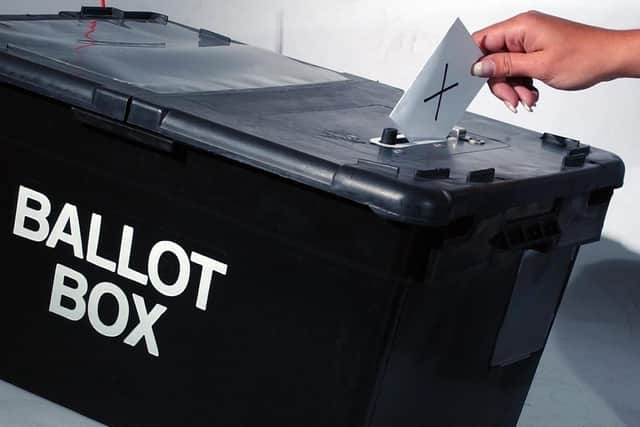What impact did lowering the voting age have for Scottish elections? What will Keir Starmer's election move mean?
Sir Keir Starmer has said that if elected, Labour will lower the voting age to 16. He argues those who can work and serve in the armed forces should have a say over how their taxes are spent.
The policy plan comes nine years after the Scottish Parliament passed legislation allowing 16 and 17-year-olds to vote in Holyrood elections. The Scottish Elections (Reduction of Voting Age) Act received unanimous backing from MSPs in June 2015, and 16-year-olds voted in the May 2016 Holyrood election.
Advertisement
Hide AdAdvertisement
Hide AdHowever, 2016 wasn’t the first time that 16-year-olds voted in Scotland. In 2013, MSPs passed the Scottish Independence Referendum (Franchise) Act to give 16 and 17-year-olds a say on the country’s future.


More than 100,000 people aged 16 and 17 registered to vote in the referendum, and 71 per cent backed independence, according to a survey commissioned by the Conservative peer Lord Ashcroft. Age was the strongest demographic predictor of vote choice in the referendum, with younger voters more likely to back leaving the UK.
What impact did lowering the voting age have in Scotland?
Voter turnout in the independence referendum was 75 per cent for 16 and 17-year-olds, significantly higher than the 54 per cent of 18 to 24-year-olds who voted. However, older people were still the most likely to turn out, with 92 per cnet of Scots aged 55 and over casting a vote.
Research carried out by academics at Edinburgh and Sheffield universities found those who voted for the first time as a 16 and 17-year-old in the referendum were more likely to vote in future elections.


In the 2016 Holyrood election, about 80,000 16 and 17-year-olds registered to vote, accounting for 2 per cent of the electorate. Overall voter turnout was 55.9 per cent – the highest at the time since the first Scottish Parliament election in 1999.
SNP candidate for Aberdeen North Kirsty Blackman said: “We’ve seen the value in extending the vote to 16-year-olds in Scottish Parliament elections, implemented under the SNP Scottish Government, and we continue to call on Westminster to do the same.”
What about in the EU referendum?
Labour tabled an amendment at Westminster to allow 16 and 17-year-olds to vote in the 2016 EU referendum. However, the bid was defeated.
Then Scottish Labour constitution spokesperson Jackie Baillie expressed her disappointment, saying: “It is hugely disappointing that on the same day young people in Scotland have been afforded a say in future decisions, that the Tories have voted to block the same rights in the forthcoming EU referendum in Westminster.”
Advertisement
Hide AdAdvertisement
Hide AdDo Britons want the voting age to be lowered?
According to a YouGov poll carried out last year, a majority of Britons oppose lowering the voting age to 16, with 50 per cent against, 37 per cent in favour and 13 per cent responding ‘don’t know’. Scots are more likely to support lowering the voting age than people in other parts of the UK, but a majority still oppose it, with 47 per cent against, 44 per cent in favour and 10 per cent saying ‘don’t know’.
The poll also found that 55 per cent of Labour voters support lowering the voting age, compared with only 18 per cent of Conservative voters.
Unsurprisingly, younger people are more likely to be in favour of lowering the voting age. People aged 18 to 49 are more likely to support the move than oppose, but there is still not a majority in favour when don’t knows are included. The majority of those aged 50 and over oppose lowering the age.
How do young Scots feel about the inability to vote in the general election?
There are plenty of young Scots who believe they should have a say in Westminster elections. Ena Saracevic, 17, said: “I’m frustrated that I can’t vote in the upcoming election, especially since my birthday is two days after the vote. I can vote in Scottish elections, but not UK ones, which doesn’t make sense. You can do so many things when you’re 16 such as getting married and joining the military.
“I find that there’s a lot of 16 and 17-year-olds who want to get involved in the political process. I think that’s taken away from them by not being able to vote in a general election, because Westminster is where most of the decisions are made.”
Who would likely benefit from a lower voting age?
Labour is most likely to benefit from a lower voting age, based on existing polling. Age was the strongest demographic predictor of vote choice in the 2017 and 2019 general elections, with young people more likely to vote for Labour. A study conducted by the Office for National Statistics found that lowering the voting age would disproportionately hit the Conservatives.
Comments
Want to join the conversation? Please or to comment on this article.